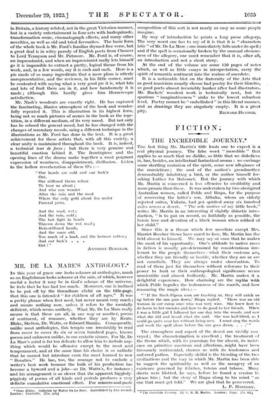FICTION;
THE INCREDIBLE JOURNEY.*
Tine last thing Mr. Martin's title leads one to expect is a real physical journey. The false word " incredible " that applies to so much that we dislike, so little that we disbelieve in, has, besides, an intellectual fantastical aroma : we envisage some startling mutation of the spirit, some new allegiance of the convictions ; the soul of the author's grandmother demonstrably inhabiting a bird, or the author himself for- saking Luther for Mahomet. But the journey with which Mr. Martin is concerned is less offensive to credibility and more prosaic than these. It was undertaken by two aboriginal Australian women, called Polde and Iliapa, for the purpose of recovering the latter's son, Alibaka, whom an elderly rejected suitor, Yukuta, had got spirited away six hundred miles across a desert. " The sole motive of my little book," writes Mr. Martin in an interesting if slightly didactic intro- duction, " is to put on record, as faithfully as possible, the heroic love and devotion of a black woman when robbed of her child."
Since this is a theme which few novelists except Mrs. Harriet Beecher Stowe have cured to face, Mr. Martin has the field almost to himself. We may say at once that he makes the most of his opportunity. One's attitude to native races in fiction is usually pre-determined by considerations irre- levant to the people themselves—what their customs are, whether they arc friendly or hostile, whether they are or are not cannibals. They arc always under observation. To read of them just for themselves without reference to their power to hurt or their anthropological significance seems unscientific and almost foolhardy. Mr. Martin makes it a delightful experience. Ilow charming are the myths with which Polde beguiles the tediousness of the march, and how reassuring the magic rites :—
" ' If the Rock-Pigeon men are tracking us, they will catch us up before the sun goes down,' Iliapa replied. 'There was an old woman in our camp once who was very wise. She knew how to do harm to her enemies and how to do good to her friends. When I was a little girl I followed her one day into the woods, and saw what she did and heard what she said. She was half-blind, so I could go quite near her without being seen. I must sing the words
and work the spell alone before the sun goes down. . . "
The atmosphere and aspect of the desert are vividly con veycd ; the characterization is excellent ; the treatment of the theme which, with its yearnings for the absent, its insist- ence on primitive emotions and affections, might have been tiresomely sentimental, charms us with its tenderness and unforced pathos. Especially skilful is the blending of the two civilizations and the way in which Mr. Martin has been able to suggest the spirituality as well as the savagery of an existence governed by fetiches, totems and taboos. Many sheets were blotted, he says, before he found a version to please him ; but the story of Iliapa dung to his mind " as one that must get told." We are glad that he persevered.
L. P.
• The Inc,cdWe Journey. C. B. M. Martin. London: Cape. 17B. atl.j


































 Previous page
Previous page